必修一 Unit 2 English around the world-Grammar
Unit 2 English around the world-reading-课件 (10)

Elsewhere in Africa and on the Indian subcontinent(次大陆), English is still used as an official language in several countries,even though these countries are independent of British rule.However, English remains very much a second language for most people,used in administration(行政),education and government and as a means of communicating between speakers of different languages.As with most of the Commonwealth(英联邦),British English is the model on which, for instance,Indian English is based.In the Caribbean and especially in Canada,however,historical ties with the UK compete with geographical,cultural and economic (经济的)ties with the USA,so that some aspects (方面)of their English follow British rules and others show US usage.
C
(3)How long did Britain rule India? D A.About 100 years. B.About 50 years. C.About 350 years. D.About 200 years. (4)Who gave American English spelling its own identity? C A.Shakespeare. B.George Washington. C.Noah Webster. D.An English king. (5)Which country may have the largest number of English learners in the world? A A.China.B.Australia. C.India. D.Britain.
高中英语 必修一 Unit2 《English around the world---Reading》
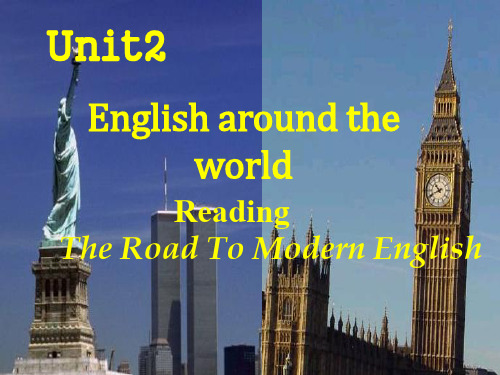
The road to modern English Some British settlers moved to
_A__m_e_r_i_c_a_.
Some British people were taken to
_A__u_s_tr_a_l_ia__.
Para 2
If an American is talking to an Englishman,
____A___.
A. They will have almost no difficulty in understanding
B. They will have a lot of misunderstandings between each other
communication
Para 3
Which of the following statements is true?
• Languages always stay the same. • Languages change only after wars. • Languages no longer change.
Noah Webster Born: October 16, 1758 Died: May 28, 1843 When Noah was 43, he started writing the first American dictionary. He did this because Americans in different parts of the country spelled, pronounced and used words differently.
英语:必修1 Unit2 English around the world--Listening课件(人教新课标)
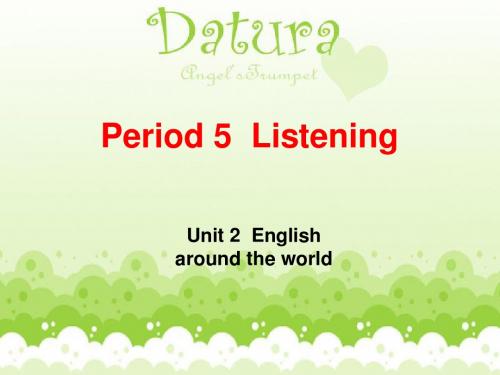
Listening – II ( 10m )
Listening Task on Page 51. • 1. Ask the students to tell the names of the countries where English is spoken. • 2. Finish the listening task. • ( Students give their own answers after listening.)
Conclusion for listening skills (10m)
• After each step of listening, ask the students who did best to tell how he / she did it, other students can have a discussion or ask him / her some questions.Everyone should try his best to find a good way for himself to improve his listening ability.
Listening – I ( 13m )
Listening on Page 14. 1. Listen to the tape for the first time and try your best to get the main idea of what is talking. 2. Listen to the tape for the second time, pay attention to the exercise of page 14. Try your best to find out the answers to these questions.
人教高中英语必修一unit-2-English-around-the-world-单词讲解

latest adj.最新的;最近的;最后的 lately(=recently) adv.最近;近来
选词填空(latter/later/late/lately/latest) ①Here are Tom and David; the _l_a_t_te_r__ is my
04 come up
come up①_上__来__,走__近_②__被__提_出____ ③__发_生__,__出__现___④__发__芽____
英译汉 (1)A foreigner came up to me and asked me the way to the railway station. 一个外国人走到我面前问我去火车站的路。 (2)The grass is just beginning to come up.
(1)vt. 以……为根据
base... on/upon 把……建立在……的基础上 be based on/upon 以……为基础/依据
(2)n.基部;基地;基础 at the base of 以……为基点;在……的底部
1.你不应该把自己的快乐建立在别人的痛苦之上。
You shouldn’t base your happiness on/upon the other’s sadness.
④The koala(考拉) is native ___to____Australia.
____考__拉__原___产__于__澳__大__利__亚__。________________________
请替换文字内容
点击添加相关标题文字,点击添加相关标题文字,点击添加相关标题 文字,点击添加相关标题文字,点击添加相关标题文字。
高中英语 必修1 (Unit2 English around the world the 5th period) 精品教案
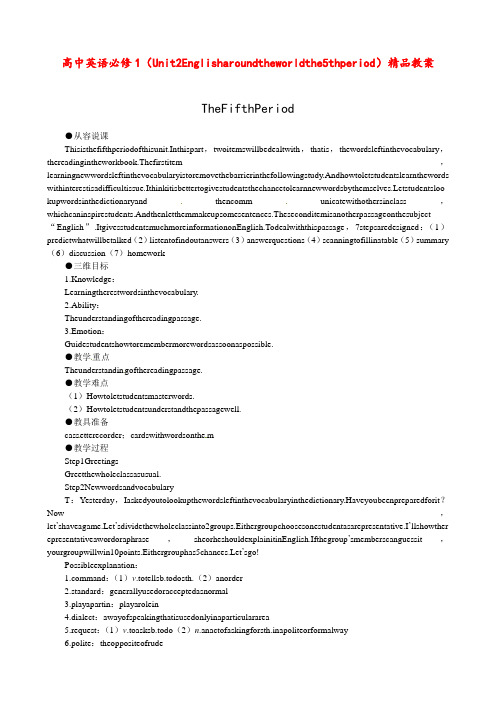
高中英语必修1(Unit2Englisharoundtheworldthe5thperiod)精品教案TheFifthPeriod●从容说课Thisisthefifthperiodofthisunit.Inthispart,twoitemswillbedealtwith,thatis,thewordsleftinthevocabulary,thereadingintheworkbook.Thefirstitem,learningnewwordsleftinthevocabularyistoremovethebarrierinthefollowingstudy.Andhowtoletstudentslearnthewords withinterestisadifficultissue.Ithinkitisbettertogivestudentsthechancetolearnnewwordsbythemselves.Letstudentsloo kupwordsinthedictionaryand thencomm unicatewithothersinclass,whichcaninspirestudents.Andthenletthemmakeupsomesentences.Theseconditemisanotherpassageonthesubject “English”.ItgivesstudentsmuchmoreinformationonEnglish.Todealwiththispassage,7stepsaredesigned:(1)predictwhatwillbetalked(2)listentofindoutanswers(3)answerquestions(4)scanningtofillinatable(5)summary (6)discussion(7)homework●三维目标1.Knowledge:Learningtherestwordsinthevocabulary.2.Ability:Theunderstandingofthereadingpassage.3.Emotion:Guidestudentshowtoremembermorewordsassoonaspossible.●教学重点Theunderstandin gofthereadingpassage.●教学难点(1)Howtoletstudentsmasterwords.(2)Howtoletstudentsunderstandthepassagewell.●教具准备cassetterecorder;cardswithwordsonthe m●教学过程Step1GreetingsGreetthewholeclassasusual.Step2NewwordsandvocabularyT:Yesterday,Iaskedyoutolookupthewordsleftinthevocabularyinthedictionary.Haveyoubeenpreparedforit?Now,let’shaveagame.Let’sdividethewholeclassinto2groups.Eithergroupchoosesonestudentasarepresentative.I’llshowther epresentativeawordoraphrase,sheorheshouldexplainitinEnglish.Ifthegroup’smemberscanguessit,yourgroupwillwin10points.Eithergrouphas5chances.Let’sgo!Possibleexplanation:mand:(1)v.totellsb.todosth.(2)anorder2.standard:generallyusedoracceptedasnormal3.playapartin:playarolein4.dialect:awayofspeakingthatisusedonlyinaparticulararea5.request:(1)v.toasksb.todo(2)n.anactofaskingforsth.inapoliteorformalway6.polite:theoppositeofrude7.retell:totellastoryagainorinadifferentform8.accent:awayofsayingwordsthatshowswhatcountry,esfrom9.recognize:toknowwhothepersonis10.eastern:inorfromtheeast ofacountryorplaceT:Welldone!Nowlet’sdealwiththesomeofthewordsandphrasesindeal.mandv.命令,指挥commandsb.todo;commandsth.;博得,应得commandthat-clausee.g.Hecommandedhismantoretreat.ThetroopswerecommandedbyGerneralHaig.Thekingcommandedthatshe(should)beexecuted.(建议,命令,要求一类词后从句中用虚拟语气,此类动词有suggest,advise,order,request,require,command,demand...)Hecommanded thebuilding(should)betorndown.n.命令[C];指挥,控制[U]e.g.Areyourefusingtoobeymycommands?Youmustobeyhiscommandthatthebuilding(should)betorndown.Takecommandof;beincommand;underone’scommand;underthecommandofsb.e.g.Shetookcommandofthisclassaftertheformermanagerleft.Shefeltincommandofherlife.ThebattleshipisunderthecommandofCaptainBlake.2.requestv.requeststh.(fromsb.);requestsb.todo;requestthat-clausee.g.Youcanrequestafreecopyoftheleaflet(宣传单).Youarerequestednottosmokeintherestaurant.Sherequestedthatnoone(should)betoldofherdecision untilthenextmeeting.n.request(forsth.);request(that)e.g.Requestsforvisaswillbedealtwithwithin48hours.Herrequestthatmoresweetsbeservedwasrefused.3.recognize辨认出;意识到;承认recognizesb./sth.(by/fromsth.)通过……认出……;recognizesth.(assth.);把……认作是……recognizethat意识到;承认e.g.Irecognizedthehousefromyourdescription.Drugswerenotrecognizedasaproblemthen.Nobodyrecognizedhowurgentthesituationwas.Werecognizedthatthetaskwasnoteasy.4.standardn.规格,标准[C&U]raise/improve/lowerstandard提高/降低标准set(sb.)astandard给某人定一个标准e.g.Hesethimselfsuchahighstandardthatheoftendisappointshimself.ofhigh/lowstandard具高/低标准的standards行为标准,道德标准amanofhighstandards一个道德高尚的人Step3ReadingT:WehavelearntEnglishformanyyears.Theninyouropinion,whatisaveryimportanthelptoyourEnglishstudy?S:teachers,books,tapes...T:Anythingelse?IsthereanythingthatyoucanturntoforhelpwhenyouareconfusedwhilelearningEnglish?S:Ithinkadictionaryisagreathelp.T:Yeah.Whenwemeetacrossnewwordsweoftenlookthemupinadictionary.Whatisthemostwidely-useddictionaryinChin ese?S:XinhuaDictionary.T:ThenwhichonedoyouthinkisusedwidelyinEnglish?S:I’msorryIhavenoidea.T:It’s LongmanDictionary andthe OxfordEnglishDictionary.Today,we’llreadapassageonthe OxfordEnglishDictionary.Nowaccordingtothetitle,whatdoyouthinkwillbementionedinthepassage?S:Ithinkthewriter,thetimewhenwasitwritten,whyitwaswritten,howitwaswritten,thefeatureofthedictionarywillbementioned.T:Now,let’slistentoittoseewhetheryouranswerisrigh t.(afterlistening)T:Doyouthinkthatyouranswerisright?S:Ithinkthatitdoesn’tmentionthefeatureofthedictionary.T:Yes.Nowlet’sreaditaloudtoanswerthesequestionsthen.①Whywasitwritten?②Whendiditstarttobewritten?③Whoisthewriter?④Howitwaswritten?S:①Toencourageeverybodytospellthesame.②Theideawasraisedin1857.And22yearsl ater,itbegantobewritten.③Threemenworkedtogetheronthedictionary:SamuelJohnson,NoahWebster,andJamesMurray.④Ittookthethreemennearlyalloftheirlivestotrytocollectwords.T:Goodjob!Thenwhofirstbegantoworkonthedictionary?S:Murray.T:Yes.Nowlet’sreadthelastparagraph.AndthenfinishthetableaboutnotesonJamesMurray’slifewithyourpartners.(checktogether)Step4Consolidation/discussionT:Afterreadingit,canyousaysomethingaboutMurray?Let’sdoachainreaction.EachstudentjustsaysonesentenceaboutMurray.T:Doyouthinkitworthsothesepeople’sspendingsomuchtimeon?Why?Nowdiscusswithyourpartnerandlistsomereasons.(discussforabout3minutes)Now,it’sshowtime.S:Wethinkthatitworththeirjob.Iftherewerenodictionaries,peoplewouldhavenoruletoguidethemwhileusingthelanguage,whichwillleadtoamessinEnglishbecausedifferentpeople wouldusedifferentlawstouseit.Thentherewillbemoredifficul tyinunderstandingoneanother.Withthedictionary,peoplehaveasetruletojudgewhethertheirwayofusingthelanguageisright.Step5SummaryandhomeworkToday,wehavelearnedthewordsleftinthevocabularyandwe’vegotsomeinformationonthelargeEnglishdictionary.Afterclass,pleasereadthewordsagainandagaintorecitethemandtrytousethemtomakeupsentences.●板书设计Unit2EnglisharoundtheworldTheFifthPeriodWordsmand2.request3.recognize4.standardUnderstandingofthepassageGuessingQuestions●活动与探究ThisresearchistodoresearchontheconceptoftheOxfordDictionaryandsomeotherkindsofdictionaryinEnglishspok encountries.SostudentsshouldworkingroupstostudytheitemsoftheOxfordDictionaryandfindoutthenamesofothertypenames Themostpopularone ThereasonAbout theOxfordEnglishDictionaryThe OxfordEnglishDictionary istheacceptedauthorityontheevolutionoftheEnglishlanguageoverthelastmillenniu m.Itisanunsurpassedguidetothemeaning,history,andpronunciationofoverhalfamillionwords,bothpresentandpast.Ittracestheusageofwordsthrough2.5millionquotationsfromawiderangeofinternationalEnglishlan guagesources,fromclassicliteratureandspecialistperiodicalstofilmscriptsandcookerybooks.The OED coverswordsfromacrosstheEnglish-speakingworld,fromNorthAmericatoSouthAfrica,fromAustraliaandNewZealandtotheCaribbean.Italsooffersthebestinetymologicalanalysisandinlistingofvariantspelli ngs,anditshowspronunciationusingtheInternationalPhoneticAlphabet.Asthe OED isahistoricaldictionary,itsentrystructureisverydifferentfromthatofadictionaryofcurrentEnglish,inwhichonlypresent-daysensesarecovered,andinwhichthemostcommonmeaningsorsensesaredescribedfirst.Foreachwordinthe OED,thevariousgroupingsofsensesaredealtwithinch ronologicalorderaccordingtothequotationevidence,i.e.thesenseswiththeearliestquotationsappearfirst,andthesenseswhichhavedev elopedmorerecentlyappearfurtherdowntheentry.Inacomplexentrywithmanystrands,thedevelopmentovertimecanbeseeninastructurewithseveral“branches”.TheSecondEditionofthe OED iscurrentlyavailableasa20-volumeprint edition,onCD-ROM,andnowalsoonline.Updatedquarterlywithatleast1000newandrevisedentries,OED Onlineoffersunparalleledaccesstothegreatestcontinuingworkofscholarshipthatthiscenturyhasproduced’(Newsweek).Tofindoutmoreaboutthe OED Online,whynotfollowourfree tour?“Aboutthe OxfordEnglishDictionary”invitesyoutoexploretheintriguingbackgroundanddistinctivecharacterofthe OED.Here,youwillfindin-deptharticlesaboutthehistoryofthe OED,aninsidelookattheprogrammesusedtoenlargeandupdatethe OED entries,little-knownfactsaboutitscontent,andmuchmore.。
英语:必修1 Unit2 English around the world--Period4 Reading课件(人教新课标)
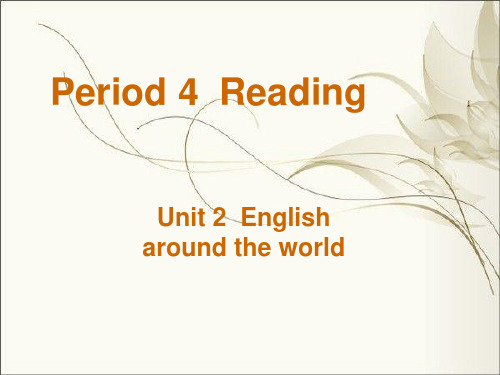
Who worked on it? Date of completion Other information
Country Education Job Most important task
Scotland Village school then taught himself. Work in a bank, teacher. Its difficulties: the biggest dictionary, work in a place where it is too hot or cold, work alone at first, only used pen and paper. Qualities needed: hard work, interest in the job, patience. Who worked on it? Murray, his two daughters and other editors. Date of 1982 completion Other information
Country
Education Job Most important task
Scotland
Village school then taught himself. Work in a bank, teacher. Its difficulties: the biggest dictionary, work in a place where it is too hot or cold, work alone at first, only used pen and paper. Qualities needed: hard work, interest in the job, patience. Murray, his two daughters and other editors. 1982
人教新课标版高一必修1_Unit_2_English_Around_the_World-reading
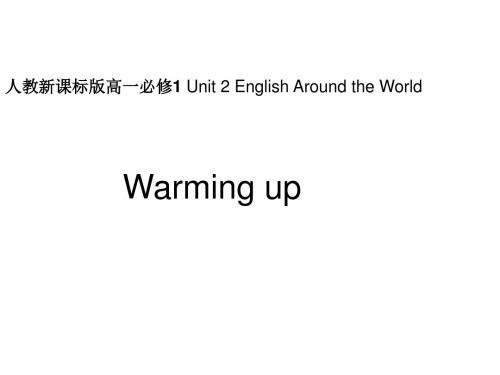
8. come up 上来, 走近; 被提出; (植物)发芽; (太 阳)升起 come up to sp 上某地来 come up with 提出 想出 He came up with a good idea in the meeting. 问题在会议中被提出来了。 •The problem came up in the meeting.
Find out the main idea for each paragraph
Time Between about ______ 1150 and AD450 _____
How is English developed?
England and based more on Spoken in ________ German _____.
语动词用单数。
More than one student wants to
go swimming.
高考链接
We advertised for pupils last autumn,
and got ___ 60. A. more than B. more of C. as much as D. so many as
1.Which of the following statement is true? A. Languages always stay the same B. Languages change only after wars
C. Languages no longer change
D. Languages change when cultures change
even if they don’t speak the same kind of English. adj. native land 祖国,故乡 native language 本族语言,母语 be native to The giant panda is native to Sichuan. n. 土著居民 study the habits of the natives even if= (even though) 尽管;即使 Even if the road is full of difficulty, I will never lose heart.
高中英语 必修1 (Unit2 English around the world the 4th period) 精品教案
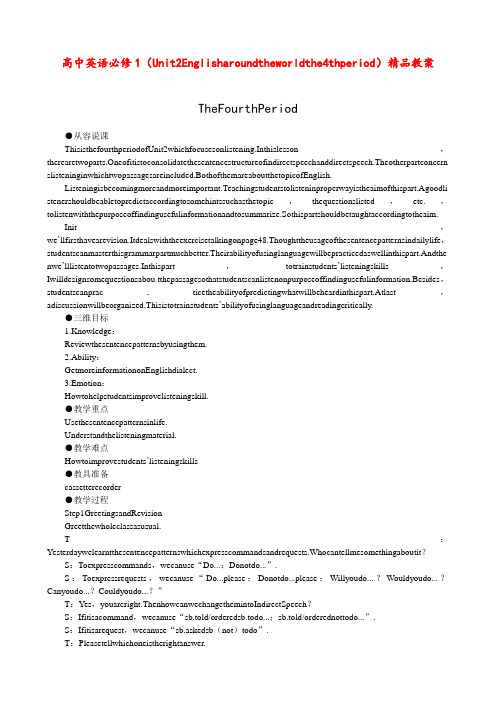
高中英语必修1(Unit2Englisharoundtheworldthe4thperiod)精品教案TheFourthPeriod●从容说课ThisisthefourthperiodofUnit2whichfocusesonlistening.Inthislesson,therearetwoparts.Oneofitistoconsolidatethesentencestructureofindirectspeechanddirectspeech.Theotherpartconcern slisteninginwhichtwopassagesareincluded.BothofthemareaboutthetopicofEnglish.Listeningisbecomingmoreandmoreimportant.Teachingstudentstolisteninproperwayistheaimofthispart.Agoodli stenershouldbeabletopredictaccordingtosomehintssuchasthetopic,thequestionslisted,etc.,tolistenwiththepurposeoffindingusefulinformationandtosummarize.Sothispartshouldbetaughtaccordingtotheaim.Init,we’llfirsthavearevision.Itdealswiththeexercisetalkingonpage48.Thoughttheusageofthesentencepatternsindailylife,studentscanmasterthisgrammarpartmuchbetter.Theirabilityofusinglanguagewillbepracticedaswellinthispart.Andthe nwe’lllistentotwopassages.Inthispart,totrainstudents’listeningskills,Iwilldesignsomequestionsabou tthepassagesothatstudentscanlistenonpurposeoffindingusefulinformation.Besides,studentscanprac ticetheabilityofpredictingwhatwillbeheardinthispart.Atlast,adiscussionwillbeorganized.Thisistotrainstudents’abilityofusinglanguageandreadingcritically.●三维目标1.Knowledge:Reviewthesentencepatternsbyusingthem.2.Ability:GetmoreinformationonEnglishdialect.3.Emotion:Howtohelpstudentsimprovelisteningskill.●教学重点Usethesentencepatternsinlife.Understandthelisteningmaterial.●教学难点Howtoimprovestudents’listeningskills●教具准备cassetterecorder●教学过程Step1GreetingsandRevisionGreetthewholeclassasusual.T:Yesterdaywelearntthesentencepatternswhichexpresscommandsandrequests.Whocantellmesomethingaboutit?S:Toexpresscommands,wecanuse“Do...;Donotdo...”.S:Toexpressrequests,wecanuse“Do...please;Donotdo...please;Willyoudo...?Wouldyoudo...?Canyoudo...?Couldyoudo...?”T:Yes,youareright.ThenhowcanwechangethemintoIndirectSpeech?S:Ifitisacommand,wecanuse“sb.told/orderedsb.todo...;sb.told/orderednottodo...”.S:Ifitisarequest,wecanuse“sb.askedsb(not)todo”.T:Pleasetellwhichoneistherightanswer.“____________,”LiMingsaidtohisteacher.A.Canyoubuymeanewwatch?B.Givemethatbook,C.Lendmeyourbike,D.CouldyouhelpmewithmyEnglish?S:IthinkDistherightanswer.T:Couldyoutellmewhy?S:BecauseAisnotlogical.BandCarecommands.Inlastperiodwelearntthatcommandsshouldbemadebypeoplewhohaveaut hority.SoIthinkhereDisright.T:Yourexplanationisperfect.Step2Talking(WorkbookP48)T:Great.Nowlet’spractisethesentencepatternsbymakingupdialogues.SopleaseturntoP48andlookatthepartoftalking.Ple a seworkingroupsoffour.Andchooseonesituationtorole-play.(5minutesforpreparation)T:Nowlet’sbegin.Possibleversion:Group1:A.(foreigner):Excuseme,couldyougivemeahand?B:Sure.Youseemtobelookingforsomeone.A:Yes.MyChinesefriendsandIpromisedtomeetattheexitofthesubway.B:Couldyouspeakabitslowly.Ican’tquitefollowyou.IguessyouarelookingforyourChinesefriends.A:I’msorry.Iwasn’tnoticingitjustnow.Yeah,wesaidthatwewouldmeethere—theexitofthesubwayat2p.m.Anditis2:15,butIstillcannotfindthem.B:Exit1orExit2?A:Whatdoyoumean?There’re2exits?B:Yes.Herearetwoexits.Soyoushouldbesurewhichoneiswhereyoupromisedtomeet.A:Isee.Iamsurethattheymustbewaitingformeattheotherexit.Thankyouverymuch!Group2:(P:parents;W:waitress;Y:you)P:Excuseme,couldyoutellmewherethetoiletis?W:Er...therestroom?Well,gostraightahead,anditwillbeattheendofthecorridor.P:Butwedonotneedrest.Wearejustlookingforatoilet.Y:ImeanwewanttogotheWC.W:WC?Wedon’thaveone.Y:NoWC!HowcanarestauranthavenoWC?W:I’msorry!ButwhatdoyoureallymeanbysayingWC?Y:It’saplacewherewecanwashhands.W:Ah,Isee.Well,gouptothesecondfloor.Y:Thankyousomuch!(Youandyourparentsgo uptwofloorsbutonlyfindemptyroomsthere.)W:Haveyoufoundit?Y:No,wewentuptwofloors,butwedidn’tfindatoiletbutemptyrooms.Group3:A:Excuseme,couldyouhelpme?B:Sure?What’sit?A:OurEnglishteacheristellingussomethingimportant,butIcanquitefollowher.She’sspeakingsofast.B:Yeah,she’sreallyspeakingfast.ThenhowcanIhelpyou?A:Couldyouasktheteachertospeakalittlebitslowly?B:OfcourseIcan,butwhydon’tyoudoso?A:Er...B:Isee.(StudentBputsup hishand)T:Yes?B:I’msorry,butwouldyouspeakalittleslowly?Step3Listening(Ⅰ)T:Yesterday,wehavelearntsomethingaboutdialectsintheUS.Todayletuslistentothedialoguespokenwithanaccent.Pleaseturntothelis teningpartonP14.Firstlistenandfindouthowmanypeoplethereareinthedialogueandwhotheyare.S:...T:Great!Nowpleaselistentoitagain,andanswerthequestionsonthetextbook.(afterlistening)Haveyougottheanswers?Nowcomparenoteswithyourpartner.T:Areyousureaboutyouranswersnow?Let’schecktogether.T:Youdidaverygoodjob.Nowwewilllistentoitagain.Afterthat,youshouldretellthestorytoyourpartner.See?S:...T:Soyousee,thereissomedifficultyforpeopletounderstandthedialects.Right?So whatwedowhilelearningEnglish?S:WecanlearnstandardEnglish.S:Idon’tthinkso,becausewehavelearntthatthere’snostandardEnglishactually.SoIthinkwhatweshoulddoistopronouncebetter,andusethecorrectwordsandgrammar.Step4Listening(Ⅱ)T:Byreadingthepassage“theroadtomodernEnglish“,wehaveknownEnglishisaworldlanguagewhichisspokeninmanycountriesandareas.Inthisperiodwewilllistentonatives peakersfromdifferentEnglish-speakingcountries.PleasemovetoP51andlookatListeningTask.Nowseveralstudentsina ninternationalhighschoolinShanghaiaredescribingwheretheycomefrom.Whatdoyouthinkyouwillhearintheirintroduc tion?S:Iguesstheywilltalkaboutthelocation,climate,people,custom,specificthings,andsoon.T:Youareveryclever.Weareintroducing someplace,mostoftimewewillgivesom edescriptionoftheclimate,people,custom,people,history,placesofinterests,andsoon.T:Listencarefully,thentellwhichtopicsarementioned.S:...T:Good.ThenIwillplaythetapeagain.Thistimeyoushouldtrytoguessthenameofeachstudent’scountry.S:...T:Goodjob.Thistime,youshouldpaymuchattentiontoeachstudent’sdescription.Afterlisteningitagain,youshoulddescribethecountryusingyourownwords.S:...T:Welldone!NowworkingroupsoffouranddiscusswithyourpartnerswhyEnglishisspokeninsomanyplacesaroundtheworl d.Makealistofthereasonsandthenreportyourgroupworkwithothergroups.Step5SummaryThisclasswehavereviewthegrammarpartbyusingitindailylife.Wehavepractisedreadingaswell.Welearnthelangua geinordertouseit.SoIadviseyoupractiseusingwhatwelearntdailysothattheycanbepartofyourknowledge.Step6HomeworkLookupthewordsleftinthevocabularyinthedictionary.●板书设计Unit2EnglisharoundtheworldTheFourthPeriodSentencepatternsGuessingthetopicsmentionedinthetape●活动与探究Thisactivityistodosomeresearchonthelisteningskills.Studentsarerequiredtosurftheinternettosearchforsomeinfor mationonadviceonimprovinglistening.●备课资料ColorsAmericanshaveusedcolorstocreatemanyexpressionstheyuseeveryday.Wesayweare“inthepink”whenweareingoodhealth.Itiseasytounderstandhowthisexpressionwasborn.Whenmyfacehasanicefresh,pinkcolor,itisasignmyhealthisgood.IfIlookgrayandashen,Imayneedadoctor.Redisahottercolorthanpink.AndAmericansuseittoexpressheat.InEnglish,thesmallandhotpeppers(辣椒)foundinmanyMexicanfoodsarecalled“redhots”,fortheircolorandtheirfiery(火辣辣的).Wesaythatfast,fierymusic,especiallythekindcalled“DixielandJazz”is“redhot”.Blueisacoolercolor.ThetraditionalbluemusicofAmericanblacksistheoppositeoftheredhotmusic.Itisslow,sadandsoulful.DukeEllingtonandhisorchestra(管弦乐队)recordedafamoussong,MoodIndigo(《深蓝的情调》),aboutthedeepbluecolor,indigo.Inthewordsofthesong,“Youaren’tbeenbluetillyou’vehadthatMoodIndigo”.Tobe “blue”,ofcourse,istobesad.Whilethecolorgreenisnaturalfortrees,itisanunnaturalcolorforhumans.Whensomeonedoesnotfeelwell,someonewhoissickforexample,wesayhelooksgreen.Whensomeoneisangrybecausehedoesnothavewhatsomeoneelsehas,wesayheis“greenwithenvy (忌妒)”.Somepeopleare“greenwithenvy”becausesomeoneelsehasmoredollars,or “greenbacks”.Dollarsarecalledgreenbacksbecausethat’sthecolorofthebacksideofthemoney.Thecolorblackisoftenusedinexpressions.Peopledescribeadayinwhicheverythinggoeswrongasa“blackday”.A “blacksheep”isthememberofafamilyorgroupwhoalwaysseemstobeintrouble.A“bla cklist”isillegal(非法的)now,butatonetime,someemployers sharedblacklistsofpeoplewhoshouldnotbegivenwork.Notallthe“black”expressionshavebadmeanings.Abusiness“intheblack”,forexample,isonewithprofits(利润).Acompany“inthered”islosingmoney.Redinkisusedtoshowlossesinafinancialreport.Profitsarewritteninblack.Ifsomeonetellsyoutoputsomet hing“inblackandwhite”,theywantyoutowriteitdown.Insomecases,colorsjustdescribeasituation.A“blackout”,inWorldWarTwo,waswhenalllightswereturnedofftomakeitdifficultforbomberplanestofindtheirtarget(目标)atnight.A“brownout”isanAmericanexpressionforreducedelectricalpowerwhichmakeselectriclightsdim.AmericanwomenusetheFrenchwordforredasthenameofthecoloredcosmetic(化妆品)whichtheysometimesusetobrightentheircheeks.It’sjustcalled“rouge”.Theyuseitespeciallywhentheyaregoingoutfortheevening,orasAmericanssay“topaintthetownred”.Thecoloryellowissometimesusedtodescribeacoward(胆小鬼).Apersonwhois“yellow”hasnocourage.Aperson’sskinmaybecomeyellowasaresultofdiseasesthatattacktheliver(肝).Yellowfeverisone.Inthepast,shipscarryingfevervictimsraisedaflagcalled the“yellowjack”.IntheUnitedStates,anactivisto rgan izationofoldpeoplecallsitselfthe“graypanthers”(灰豹).Thenamecomesfromthegrayhairofitsmembersandfromthepanther,afierceanimalofthelionorleopard(豹)family.WordsandIdiomsToeatcrow乌鸦肉根本没法吃,因此要一个人吃乌鸦,那肯定是非常难受的。
必修一(Unit2 English around the world the 1st period)
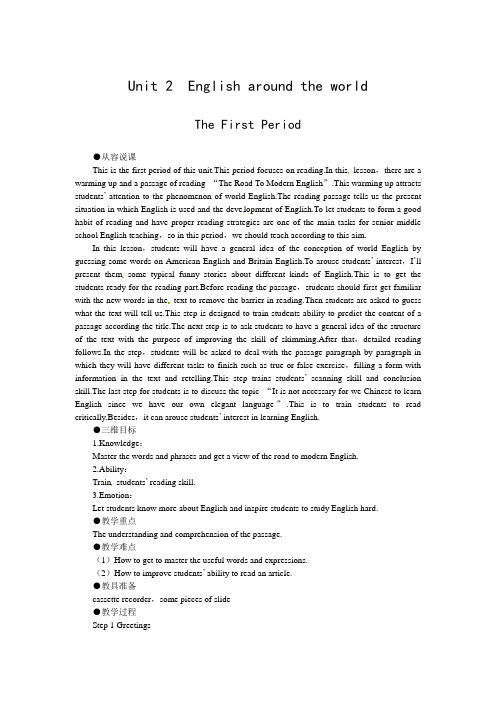
Unit 2 English around the worldThe First Period●从容说课This is the first period of this unit.This period focuses on reading.In this lesson,there are a warming up and a passage of reading “The Road To Modern English”.This warming up attracts students’ attention to the phenomenon of world English.The reading passage tells us the present situation in which English is used and the deve lopment of English.To let students to form a good habit of reading and have proper reading strategies are one of the main tasks for senior middle school English teaching,so in this period,we should teach according to this aim.In this lesson,students will have a general idea of the conception of world English by guessing some words on American English and Britain English.To arouse students’ interest,I’ll present them some typical funny stories about different kinds of English.This is to get the students ready for the reading part.Before reading the passage,students should first get familiar with the new words in the text to remove the barrier in reading.Then students are asked to guess what the text will tell us.This step is designed to train students ability to predict the content of a passage according the title.The next step is to ask students to have a general idea of the structure of the text with the purpose of improving the skill of skimming.After that,detailed reading follows.In the step,students will be asked to deal with the passage paragraph by paragraph in which they will have different tasks to finish such as true-or-false exercise,filling a form with information in the text and retelling.This step trains students’scanning skill and conclusion skill.The last step for students is to discuss the topic “It is not necessary for we Chinese to learn English since we have our own elegant language”.This is to train students to read critically.Besides,it can arouse students’ interest in learning English.●三维目标1.Knowledge:Master the words and phrases and get a view of the road to modern English.2.Ability:Train students’ reading skill.3.Emotion:Let students know more about English and inspire students to study English hard.●教学重点The understanding and comprehension of the passage.●教学难点(1)How to get to master the useful words and expressions.(2)How to improve students’ ability to read an article.●教具准备cassette recorder,some pieces of slide●教学过程Step 1 GreetingsT:Good morning,boys and girls!S:Good morning,teacher!Step 2 Warming upT:English is a widely used language.Do you know in which countries English is spoken as their native language?S a:The US,the UK,Australia,Canada...T:(a slide:Nancy:Oh,there you are.Now then,did you have a good flight?Joe:Sure,we flew all the way direct from Seattle to London.Nancy:You must be very tired.Did you sleep at all on the plane?Joe:No,not really.I’m very tired.Could I use your bathroom?Nancy:Why,of course.You don’t need to ask,just make yourself at home.Let me give you a clean towel.Joe:A towel?Nancy:Yes.Here you are.The bathroom is upstairs.It’s the second door on the left.(After a while)Nancy:Have you found it?Joe:Well,eh,yes,I mean no.I mean,I found the bathroom,but I didn’t find what I was looking for!)Here is a short dialogue.Read it and discuss with your partner:What is it that Joe can’t find in the bathroom?Why can’t he find it?S b:It is the toilet.T:And why?S c:Perhaps when Joe says “bathroom”,he means a place,where there is a toilet.But in Nancy’s eyes,it is a place where people can only have a bath.T:You are right.Do you know why there’s a misunderstanding between them?S d:Because they sp eak different kinds of English.T:Great.There’s more than one kind of English in the world.In some important ways they’re different.They’re called world English.Can you guess what they include?S e:Canadian,British,American,Australian and Indian English.T:Right.So you know even two native speakers of English may still not speak the same kind of English.Look at the examples on P9.Now try to guess which of the following words are British English and which are American English.Suggested answers:Am.English:mom;on a team;rubber;gasBr.English:mum;in a team;eraser;petrolStep 3 New WordsT:From today on,we’ll learn something about English around the world.First of all,let’s get familiar with the new words.Yesterday I asked you to read the new words and look up the meaning of them.Now let’s have a game in which one of you tells us the meaning or the explanation of the words and the others guess which word it is.Let’s go!Suggested explanation:1.include:have something or somebody as one of a group.e.g.:The tour included a visit to the Science Museum.2.play a role in:have a part in3.international:connected with two or more countries4.native:(1)connected with the place where you have always lived or have lived for a long time(2)a person who lives in a particular place,especially sb. who has lived there a long time5.elevator:lift6.flat:(1)having a smooth surface (2)(Br. E)a set of rooms for living in7.apartment:(Am. E)a set of rooms for living in8.modern:of the present time or recent timee up:to move toward10.culture:the customs and beliefs,art,way of life and social organization of a particular country or group11.actually:really;in fact12.present:(1)existing or happening now (2)being in a particular place13.rule:control14.vocabulary:all the phrases and phrases you learnage:the way in which words are used in a language16.identity:who or what sb./sth. isernment:the group of people who are responsible for controlling a country or a state18.rapidly:fastT:That’s great!You’ve made a good preparation.Now please read the words together.(show words and explanations on the slide)Step 4 Pre-readingT:Just now,we’ve known that there’re many kinds of English in the world.Then why are there so many kinds?Ss:We don’t know.T:Anyway,we’ll find out the cause today.Now read the title of the passage “the road to modern English”.What do you think it will tell us?S f:I guess it will tell us the development of English.Step 5 SkimmingT:Now let’s find out whether your answer is right.So please read the passage fast in silence and find out the main idea of each paragraph.Suggested answer:Para.1:Brief introduction of the change in English.Para.2:An example of different kinds of English.Para.3:The development of English.Para.4:English spoken in some other countries.Step 6 ScanningT:You’ve mastered the structure of the passage.Now please read para.1 and 2 loud in detail.T:(several minutes later)Have you finished?Here’re some statements of which some are right while some not.Read them and then tell whether they are true or false.If false,please find out the mistake and correct it.(slides:1.Most of the English speakers in the 16th century lived in England.2.More and more people use English as their first or 2nd language.3.The US has the largest number of English speakers.4.Native English speakers can understand everything because they speak the same kind ofEnglish.)S g:The first one is true.S h:The second one is true.S i:The third one is false.China has the largest number of English speakers.S j:The fourth one is false.Native English speakers may not be able to understand everything because they do not speak the same kind of English.T:You did a very good job.Now please read para.3 after the tape.And then fill in the form onThe Road To Modern EnglishThe cause:Cultures communicate with one anotherTime Things that happenedBetween AD 450and 1150Based on German1150 to 1500 Less like German;more like French→why?→because Frenchmen ruled England thenIn the 1600’s Shakespeare broadened the vocabulary.A big change in English,giving its own identity→why?→caused by “American Dictionary of the English language”written by Noah WebsterLater British people brought English to AustraliaT:We know culture communication brings about changes in English.Can you think of any effect that Chinese has on English?S k:In English there are some Chinese words such as gongfu,long time no see,...T:Great!With more closely communication of culture,English is changing more frequently.T:As we all know,English is spoken as the native language mostly in western countries.Then what about English in some other parts of the world?After reading the last paragraph,would you please say something about the present situation of English in your own words?S l:It is also spoken as a foreign or 2nd language in many other countries.For example,in India,it is used for government and education.In some African and Asian countries,it is also spoken,such as in South Africa,Singapore and Malaysia.While in China,the number of English speakers is increasing fast.T:Quite good.Step 7 DiscussionT:So far,we’ve known that English is becoming more and more important in China.It has been an important subject for Chinese students.But someone say that Chinese is a much more elegant language.So it is more important for us to master it and it is not so necessary for us to master a foreign language.Do you agree with this opinion and why?Suggested answer:I don’t agree with it.With the cultural communication becoming more and more frequent,the chance to contact foreigners,exported goods,international conferences,and so on,is more and more.As the most widely used language,English is regarded as the language used in most international situations.Thus,if we want to keep up with the times,we’d better master English and use it as a tool.Step 8 Summary and homeworkT:Today we’ve learned an article on “the road to modern English”.After class,you shouldread it again and again to get the idea of the text further.Do the exercises of comprehending and try to tell your partner something about English in our own words.That’s all for today.Class is over.●板书设计Unit 2 English around the worldThe First PeriodNew words:Main idea of each para-graph:... ...... ...●活动与探究This activity is to make research into differences between different kinds of world English and some words from other languages in English.Divide students into two groups to do research and fill the following table in their free time.Differences Pronunciation Spelling MeaningUsage...Words from other languages Chinese Japanese French Spanish German...●备课资料Soon There Will Be No Such Thing As “Wrong”English In this article:Senior Indian journalist Gautaman Bhaskaran says that English is so flexible that one day there will be too many variations around the world.English is a victim of its own success.The other day The Times in London displayed a cartoon showing an excited schoolboy flaunting his test scores:“I done good in English.”Days later,editors of the Oxford Dictionary of English rued the spread of what they termed “greengrocer’s English”.Grammar and syntax,they regretted,were going out of fashion.Others in England—in the Oxf ord University Press,the BBC and so on—said the incorrect use of cliches were marring the smooth flow of a great language whose ability to imbibe and absorb has been one important reason for its success.This success also stems from the language’s unique position of being the only one spoken in most parts of the world.Really,English has no boundaries.Even in countries such as Japan and China,which were not colonized by Britain,English is making a determined “conquest”.Unfortunately,such a conquest is not always welcome because a language sometimes doubles as a political weapon.At some point it ceases to be just a means of communication and English is a classic example of this.It has always led a troubled life.It has been disliked,even hated,largely because the people who originally spoke English conquered,colonized and terrorized half the world,or just about.The animosity to the language continues,at least in some places.The bitterness that the French,for instance,have for English is a g ood example of a language being giving a quasi-political role in society.Fortunately,this aversion does not run as it did some years ago,and there is a growing realization that English is the lingua franca.China and Japan,among a host of other nations,have been making serious efforts to promote the language.Some months ago there was a hue and cry in Singapore over the spread of “terrible English”which the authorities called “Singlish”.“Down with it!”they said,and urged Singaporeans to learn correct English,the phenomenal flexibility of which has often made things difficult for those who have to use it every day.Today even university graduates find it hard to pen a couple of correct sentences in it.More horrifying is that many teachers and university vice-chancellors speak and write poor and ungrammatical English.Often,they are found to be out of touch with what is called “usage”and,as we all know,this is one of the pillars the language rests on.Yet,despite the mess that English is in India,the nation has—more than two centuries after Samuel Johnson wrote his English dictionary—become the hottest destination for top lexicographers.The new 10th revised edition of the Oxford Concise English Dictionary includes hundreds of Indian words.Leading the list of 600 Indian English entries are “Hindutva”(Hindu identity),“dada”(older brother),“panchayat”(local administration),“chai”(tea),“pani”(water),“puri”(a dish made of wheat)and “dosa”(rice pancake).In fact,Indian words from 20 per cent of entries and rank as the third-largest component after American and Australian English segments.Other former British colonies such as New Zealand,South Africa and the Caribbean islands follow the Indian English collection of words.English,despite its hiccups,is endearing to the common Indian man or woman.About 150 years after Lord Macaulay introduced the language in India to create “babus”(clerks)for the British bureaucracy,70 million Indians speak English,a number that is higher than that in Britain.However,there is a sneaking fear among Puritans that with this kind of sp read,English may stop being English.While the French have fanatically preserved the purity of their language,the English have liberally allowed other influences to affect their lingo.So,what is seen as its strength —the fact that people all over the world understand it—can be an undermining obstacle.There might be a serious problem if every state or continent were to have its own version of English.As one writer said:“There is a risk in relentless atomization.”With too many variations of the language,a time may come when one group of English-speaking people may not be able to understand another.This is happening.Hear the way Singaporeans speak English.Listen to the Australians pronouncing “e”;it sounds like “a”.A few of the films made lately by British directors Ken Loach and Mike Leigh had to have subtitles in English.Accents in the north of Britain can be hard for people in the south to understand,let alone those outside the island.The point is,no language must be allowed such flexibility—anything goes in the name of functional communication—that people begin to take liberties with it.Ultimately,there may be no such thing as wrong English.The schoolboy in the Times cartoon was doing just that.He knew nobody would scold him for getting his English wrong.不久以后就没有“错误的”英语这一说了英语成了自身成功的牺牲品,前几天,伦敦的《泰晤士报》刊登了一幅漫画,上面画了一个兴高采烈的男学生炫耀他的考试成绩:“I done good in English”(我的英语成绩不错)几天后,《牛津英语词典》的编辑们对他们所定义的“菜贩子讲的英语”的传播大为悲叹他们感到遗憾的是,语法和句法都过时了其他一些在英国——牛津大学出版社、BBC(英国广播公司)等的人说:不正确地使用陈腐辞藻损害着一种伟大语言的流畅性,英语博采众长的能力是其成功的一个重要原因英语的成功同样源自其独特的地位,它是在世界的大多数地区都使用的惟一一门语言的确,英语没有国界甚至在没有被英国所殖民过的国家,诸如中国和日本,英语正进行着决定性的“征服”不幸的是,这种征服不总是受到欢迎,因为一种语言有时会被兼作政治武器有时候,语言不再仅仅是一种沟通的工具,而英语又是这种情况的一个经典范例英语总是摆脱不掉困扰它曾不受人喜欢,甚至遭人厌恶过主要是因为最初讲英语的人征服、殖民和胁迫了世界的一半地区,或者说将近一半地区对英语的敌意还在持续着,至少在某些地方仍是这样语言在社会中被赋予了一种准政治的作用,比如法国人对英语的嫉恨就是一个很好的例子幸运的是,这种对英语的厌恶不像多年前那么严重,人们越来越认识到英语其实是一种混合语在众多国家,比如中国和日本,一直在大力推广英语的使用几个月前在新加坡,人们大声抗议被当局称作“新加坡式英语”的“可怕的英语”正在到处传播“够了!”他们说道,并督促新加坡人学习正确的英语对于那些每天都必须使用英语的人来说,英语异常的灵活性经常把事情搞得很困难现在,即使是大学毕业生都会发现写几句正确的英文句子很难更可怕的是,许多教师和大学副校长说着和写着糟糕的不合语法的英语人们经常会发现这些人不注重语言的“用法”,正如我们都知道的,用法是语言的支柱之一然而,尽管英语在印度被搞得一团糟,在塞谬尔·约翰逊编写了他的英语字典两个多世纪以后,这个国家已经成为顶级词典编纂者们最热门的词汇来源地《牛津简明英语词典》新近出版的第十修订版收录了几百个印度词汇在600条印度英语词条中最重要的词汇是“Hindutva”(印度身份),“dada”(长兄),“panchayat”(地方行政机关),“chai”(茶),“pani”(水),“puri”(用小麦做的食品),以及“dosa”(烤米饼)实际上,印度词汇构成了20%的词条并且在美国和澳大利亚英语条目之后,成为第三大词典词汇组成部分从其他前英国殖民地,比如新西兰、南非和加勒比海群岛所收录的词汇都位居印度英语之后普通的印度人都还是喜欢英语的,尽管有时会有些小问题麦考利勋爵将英语引入到印度并为英国官僚机构创造了像“babus”(职员)这样的词汇,150年之后,有7000万的印度人在讲英语,人数比在英国讲英语的人都要多然而,清教徒却普遍心存恐惧,怕如此下去英语会变得面目全非了与法国人狂热地保护法语纯洁性的做法不同,英国人很大方地接受了外界对其影响结果是,世界各地的人都懂英语——可以说这一优势削弱了英语的纯洁性如果每个国家或大陆都有其版本的英语的话,那么问题可能就严重了正如一位作家所说的:“无休止使英语分化是危险的”英语如果有太多的变种的话,会出现这样的情况:当一群讲英语的人可能听不懂另一群人所讲的英语这种情况事实上正在发生您来听听新加坡人说的英语听澳大利亚人发“e”这个音的;听起来就像发“a”这个音最近由英国导演肯·露弛和麦克·雷导演的几部电影中不得不加上了英语字幕,因为英国北部人的口音让英国南方的人很难听懂,更不用说英国以外的人了问题的关键是,没有什么语言可以允许有如此的灵活性——以至于人们借实际沟通之名,就可以随意使用了最终的结果是:可能不会有错误的英语这回事了在《泰晤士报》卡通中的男学生正是这么做的因为他清楚没有人会指责他所讲的英语不正确。
人教版高中英语 必修一 Unit2 《English around the world---Reading》课件 (共26张ppt)

BrE
AmE
dance [da:ns] dance[dæ ns]
pronunciation not [nɒt]
not [nɑt]
car [kɑ:]
car [kɑr]
spelling
colour centre traveller
color center traveler
vocabulary
pub Biscuits football
according to the text.
The English
From AD 800 to 1150,
between AD 450 those who ruled
and 1150 was
England spoke first
based more on _G_e_r_m__a_n.
_D_a_n_i_s_h_ and later _F_re_n_c_h__.
a matter of fact, China may have the
_la_r_g_e__s_t number of English learners.
Why do you think people in China want to learn English?
The reasons why people in China want to learn English are as followings: one is that…; another one is that…
0 0 0 14 054321 0987654321
Hours
Miime
0 0 0 14 054321 0987654321
Hours
Minutes
Seconds
人教版高中英语 必修一 Unit2 《English around the world---Reading》 课件 (共28张ppt)
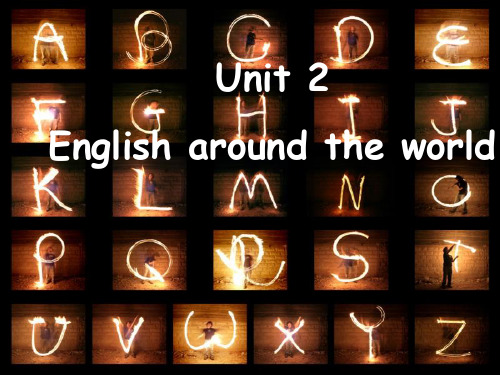
Reading
The Road to Modern English
Prediction
1. Look at the title and predict what the passage is about. (the main idea)
The road to modern English
2. If you are given this title, how will you organize this article? What sequence(顺 序)will you adopt?
65-1947
English spoken in India
From 19th century Dictionaries standardized the spelling
Summary of the passage
• Languages change and develop when _c_u_l_tu_r_e_ meet and _c_o_m_m__u_n_ic_a_te_ with each other. English enriched its v_o_c_a_b_u_la_r_y during a long time, absorbing(吸收) words from _G_e_r_m_a_n_, D__a_n_is_h_, and _F_re_n_c_h_.
人教版高中英语 必修一Unit2 《English around the world---Warmi
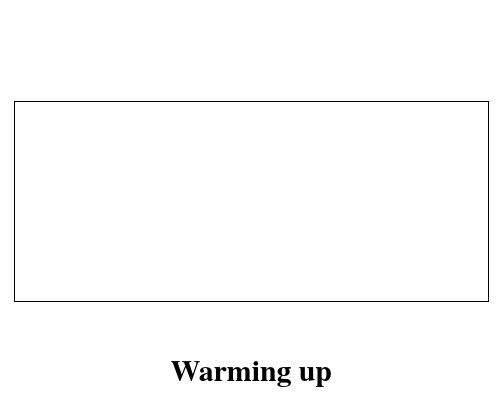
In what situations is English used? An international talk/meeting
Doing international trade
At school
Listening to radio, watching TV…
Singing English .
in South Asia.
Task 3 Read the text carefully and answer the following questions. 1. WTihmaet.is the clue of the passage?
2. WInhtehned1i7dthpceeonptluerfyr.om England begin to move to other parts of the world?
Unit 2 English around the world
Warming up
Discuss these questions
•How many languages do you speak? Which is your native language?
•If we speak more than one language, in which situations do we use the language?
“To be or not to be, this is a question” is a quotation from Hamlet which is
wrote by William Shakespeare .
William Shakespeare (1564- 1616) was a famous English writer, whose best-known works contain Hamlet, Romeo and Juliet, the merchant of Venice, King Lear, etc.
Unit2 English around the world (人教版新课标)解析版

“地毯式过单词”(人教版新课标)必修一Unit2 English around the world一、单词拼写(根据汉语或首字母提示写出单词的完全形式)1.I made friends with the (当地人),and they were concerned about me.【答案】natives【句意】我和当地人交朋友,他们都很关心我。
2.I paid a visit to Russia which is rich in natural resources and the travel(使丰富) my horizons.【答案】enriched【句意】我参观了资源丰富的俄罗斯,这次旅行丰富了我的视野。
st week some city o suggested the city might be interested in turning the old theater intoa museum and public meeting place.【答案】officials【句意】上周一些官员表态城市公众可能对把老剧院改造成博物馆和会议室感兴趣。
4.The ship will start its maiden (航行) next Monday,which makes me unable to keep calm.【答案】voyage【句意】下周一这艘船将开始它的第一次航行,这使我激动不已。
5.If you set down just one more new word each day,in the next year you will increase yourv by more than 300 words.【答案】vocabulary【句意】如果你每天记下一个单词,明年你就学会三百多个。
6.As you know,bamboo always stands s ,so it represents “noble”and “strong-willed”.【答案】straight【句意】正如你所了解的,竹子笔直代表着高贵与意志坚强。
英语:必修1 Unit2 English around the world--Speaking&Writing课件(人教新课标)
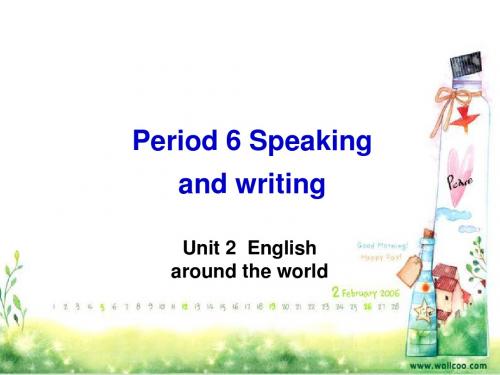
Writing – II ( 15m ):
Write a passage:
Title:My Experience of learning English Words: at least 100. Content:Paragraph 1 My problem in learning English. Paragraph 2 How I can improve my English. Paragraph 3 What I like about learning English. Paragraph 4 How I hope to make use of my English?
Read the dialogue on page 15 and find out the different British and American English words.
Amy (American) subway left Lady (British) underground left-hand side
Read the dialogue on page 15 and find out the different British and American English words.
Amy (American) subway left keep going straight two blocks right Lady (British) underground left-hand side go straight on two streets right-hand side
Read the dialogue on page 15 and find out the different British and American English words.
人教版高中英语 必修一 Unit2 《English around the world---Reading》 课件

A. 14th
B. 15th C. 16th
8
Read the passage to find the main idea of
each part.
9
Find out topic sentences (主题句) of each paragraph.
Para1. Today, more people speak English as their first , second or foreign language than ever before. Para 2. Native English speakers can understand each other even if they don’t speak the same kind of English.
They can not
understand_e_v_e_ry_t_h_ing .such as: flat in
Britain
a_p_a_r_tm__e_n_t in
America
12
Para 3-4. All languages change when cultures communicate with one another.
Para 3. All languages change when cultures communicate with one another. Para 4. The language was settled.
Para 5. English is spoken as a foreign or second language in south Asia/ Africa and Asia.
4
Match
because of come up
人教高一英语必修一 Unit2 English around the world-Reading
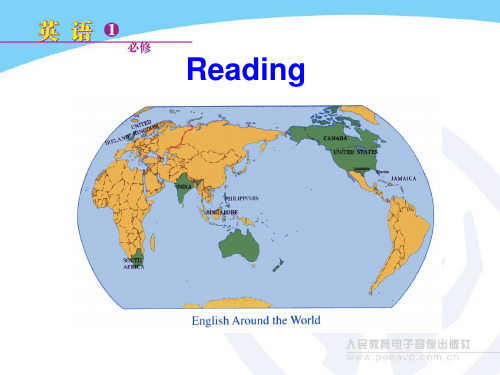
. separate identity to ____________ English spelling
Now
English is spoken in _________, __________, __________, __________ ________and so on.
Why do many people speak English?
By the 19th century
The English language was settled. Two big changes: •Samuel Johnson wrote his __________. •Noah Webster wrote ______________________________ and gave a
3. Guess according to the title.
The road to modern English
?
The road
Modern English
the development of English language
What kind of English before Modern English?
India, …
The road to modern English
The English was spoken in England. It was based more on
ADE45n0g-1l1i5s0h is s_p__o_k__ethnanitnhe English we speak at present.
Reading
Questions:
1. With your partner, list the countries that use English as an official language.
- 1、下载文档前请自行甄别文档内容的完整性,平台不提供额外的编辑、内容补充、找答案等附加服务。
- 2、"仅部分预览"的文档,不可在线预览部分如存在完整性等问题,可反馈申请退款(可完整预览的文档不适用该条件!)。
- 3、如文档侵犯您的权益,请联系客服反馈,我们会尽快为您处理(人工客服工作时间:9:00-18:30)。
(5). 若直接引语的谓语中含有would, should, might, must, used to, ought to, had better等动词时。如: She said, “We should help each other.” → She said we should help each other.
例如: He said: “I’ve left my book in my room.” → He told me that he had left his book in his room.
2.疑问句的间接引语。一般疑问句后连接
词用if或whether,而引述选择疑问句时
只能用whether,引述动词用asked,没
4. Rose asked Tom, “Did you see my
purse?”
Rose asked Tom ___.
A. whether that he had seen her purse
B. whether he had seen her purse
C. that whether he had seen her purse
Grammar
ቤተ መጻሕፍቲ ባይዱ
复习 (把下列直接引语改为间接引语) 1.He said: “I’ve left my pen in my room.”→ He told me that he had left his book in his room. 2.She said: “He will be busy.”→
The mother asked Tom to get up early.
直接引语如果是以“Let’s”开头的祈
使句,变为间接引语时,通常用 “suggest +动句词(或从句)。” 例如: He said, "Let’s go to the film." →He suggested going to the film.
D. told me; not to do
3.“Don’t put it on my hat.”his wife said to him.
His wife told him ___put it on ___hat.
A. don’t, his
B. don’t, her
C. not to, his
D. not to, her
1.The teacher said to the students,
“Don’t waste your time.” →
The teacher told the students not
to waste their time.
2.The mother said, “Tom, get up
early, please.”→
→ The
teacher asked me how I had repaired it.
4.如何变时态:
直接引语
一般现在时 一般将来时 现在进行时 一般过去时 现在完成时 过去完成时
间接引语
一般过去时 过去将来时 过去进行时 过去完成时 过去完成时 过去完成时
如: 1) She said. “I have lost a pen.” →She said she had lost a pen. 2) She said. “We hope so.” →She said they hoped so. 3) She said. “He will go to see his friend.” →She said he would go to see his friend.
但要注意在以下几种情况下。在 直接引语变为间接引语时,时态 一般不变化。
(1)直接引语是客观真理。 “The earth moves around the sun and the moon moves around the earth”, the teacher told me. → The teacher told me the earth moves around the sun and the moon moves around the earth .
有间接引语的可以加一个间接宾语me, him等。 例如: She said to Tom, “Can you help me?” → She asked Tom if /whether he could help her.
3. 特殊疑问句用原句中的疑问词作连接 词,改为陈述语序。例如:
The teacher asked, “how did you repair it?”
D. that if he has seen her purse
5.He asked me ________ with me.
A. what the matter is B. what the mater was C. what’s the matter D. what was the matter
指示代词、时间状语、地点状语的变 化: this→ that; these→ those ; now→ then; yesterday→ the day before; today→ that day; tomorrow→ the next day; next week (month, year)→ the next week (month, year); ago→ before; here→ there.
C. asked ; to close
D. said to; please close
2. He said, “Don’t do that again.” He _____ me _______ that again. A. said to me; not to do B. said to me; don’t do C. told me; don’t do
10.He said, “Mother, the boy is very
naughty.”
→He ____ very naughty.
A. said his mother that the boy was B. said to his mother that the boy is C. told his mother that the boy was D. spoke to his mother that the boy was
练一练 1. He said, “My sister was here for three days.” He said that____ sister ___ _____ his had been ____ for there ___ three days. 2. She said ,”I’ll go there tomorrow.” She said that ___ would go there she _____ ___________. the next day
5.如何变状语:
直接引语变间接引语,状语变化有其内
在规律,时间状语由“现在”改为“原 来”例: now变为then, yesterday变为 the day before, today变为that day。 地点状语, 尤其表示方向性的, 或用指示 代词修饰的状语, 由“此”改为“彼”
(例: this 改为that), 如: He said, "These books are mine." →He said those books were his.
解析:如果直接引语是“What’s the matter?” “What’s wrong?” “What’s the trouble?”, 变间接引语时语序不
变.
6. He asked , “Are you a Party member or a League member?”
→He asked me ______.
She said that he would be busy.
3.She said to Tom, “Can you help me?”→ She asked Tom if/whether he could help her.
复习规律
1. 陈述句的间接引语—连接词用that, 在
口语中可省略。引述动词用said, told,等。
或He suggested that they should go to
see the film.
练一练 1.“Please close the window,” he said to me. →He ______ me _____ the window.
A. said to; to close
B. told to; closing
3. She said, “Did you see him last night?” She _____ me __________________ asked if/whether I had seen him _______________. the night before 4. “When did you go to bed last night?” Father said to Peter. Father asked Peter ______________ _____ when he went to ____ the night ______. bed before
祈使句的直接引语和间接引语 祈使句的间接引语——采用 “动词+宾语+不定式”结构。 told/asked/ordered sb. (not) to do
sth.
如果祈使句是表示请求,间接引语的 动词常用ask,如果是表示命令,间接 引语的动词常用tell, order, command 等。
例如:
解析: 反意疑问句要 变成whether或 if引导 的宾语从句 .
